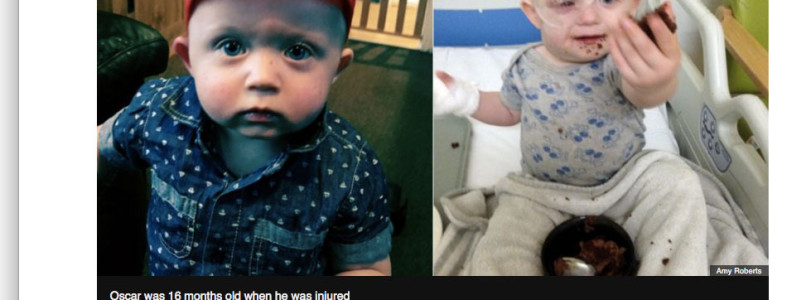
Toddler Loses Eye to Crashing Drone
In the UK a toddler has lost his right eye after a crashing UAV propeller sliced his eye ball
I would really like to start this by sending our best wishes to Oscar and the entire Roberts family. This is a tragic incident that will effect this little guy for the rest of his life. It is always sad to hear about someone being injured and the fact that he is so young makes it all the more tragic.
The UAV in question was a DIY unit with no guards around the props. While bringing the unit in for a landing it clipped a tree branch and spun out of control. The spinning UAV’s rotor clipped Oscar’s eye. After being rushed to the hospital the doctors worked to save the eye but were unable.
Many people are likely to say that kids have always lost eyes and you shouldn’t over-react to UAV’s, and we agree this is true, it is VERY important to practice safe flying with your UAV’s at all times. This is an opportunity for ALL of us to appreciate the danger that UAV’s can pose and to go over some safety rules.
Below are some recommendations from the DS Drones team to make sure these tragic events do not happen.
- Always make sure the landing and takeoff spots are clear of animals, children and anyone or anything else that may get in the path of the rotors.
- Avoid areas with people or places where a crash can cause damage. Crashes DO happen and you must approach an area where you will be flying your drone by assuming you WILL crash.
- Never fly within 5.6 miles (9 km) of an airport and never above 400 feet (120 m) the legal limit in most placed in North America. Make sure you do some web searching and get up to date information, from a RELIABLE source, for where the flight paths and airports are, and for the legal height limits in your area.
- Always check the weather before flying. Not all drones are rated for rain and/or wind. Untimely weather could result in an untimely crash, potentially injuring people and damaging property if you did not follow our first pointer
- Always keep your UAV within eyesight. This also means do not fly at night or in fog. It is dangerous and you cannot react to unexpected events as easily.
- Pre-Flight checks are very important. Always make sure that your UAV is flight worthy before taking off!!
- Never fly in restricted air space, this includes but is not limited to military bases, prisons and forest fires. Make sure you research the laws in your area properly before flying so you are aware and prepared.
- Avoid areas where you may interfere with emergency responders. Give our police, paramedics and fire fighters the space they need to do their job safely and effectively.
We hope this helps prevent future accidents and you all enjoy your UAV’s safely for years to come.
Until next time best wishes to you all from the team here, safe flying!
– DS Drones Team

No comments yet.